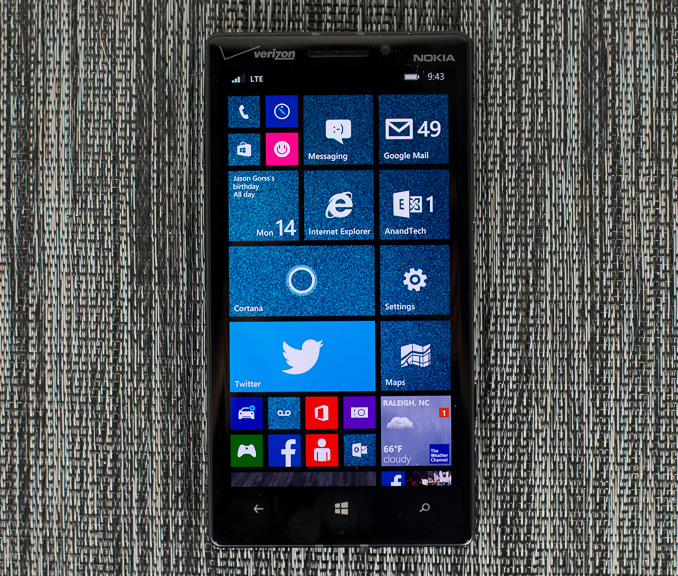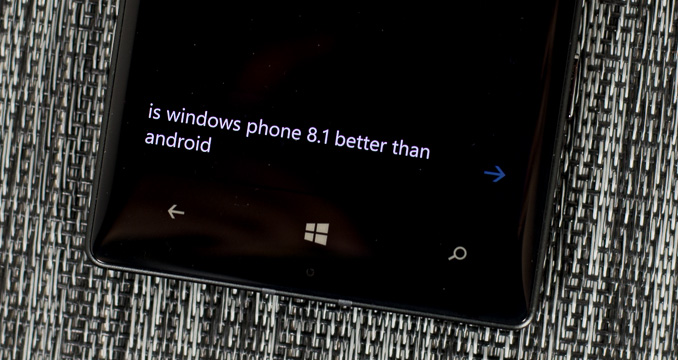Windows Phone 8.1 Review
by Anand Lal Shimpi on April 14, 2014 10:00 PM EST- Posted in
- Smartphones
- Microsoft
- Mobile
- windows phone
- Windows Phone 8.1
Final Words
Windows Phone 8.1 is a much needed and well thought out upgrade to the WP platform. Action Center is extremely well executed. The new keyboard brings the most polished implementation of shape writing to Windows Phone. IE11 is faster and more compatible than IE10. And Cortana offers hope in the way of eventually turning Windows Phone into even more of a personal digital assistant. The upgrades are solid.
In terms of high level features, Windows Phone 8.1 brings the platform up to near parity with Android and iOS. If what you’re doing is calendar, basic camera work, email, SMS, web browsing, Facebook and Twitter you can have a good experience on all three platforms. In fact, there’s an attention to detail that Microsoft exhibits in Windows Phone 8.1 that at times rivals that of Apple. I suspect this is why Windows Phone users, although a small portion of the market, are generally satisfied with their platform.
With Windows Phone however, Microsoft finds itself in a very frustrating position. It lacks the marketshare necessary to make Windows Phone a primary target for developers. Apps are more likely to launch first on Android and/or iOS. Part of the problem is one of marketshare, the other part is one of philosophy. For the past 3.5 years Microsoft needed to rev Windows Phone more frequently than Android or iOS, and it needed to be on the forefront of hardware adoption as well. For whatever reason, Microsoft did neither. Windows Phone saw, at best, as many major OS updates as Android/iOS, and at worst trailed the two in terms of minor updates. I’d argue that both Android and iOS changed more since Windows Phone’s introduction than WP itself, which shouldn’t be the case as both of those platforms are far older (and thus should be more mature/changing less substantially). On the hardware side, it’s important to note that no one ever wins by consciously choosing slower hardware. Building efficient software is one thing, but failing to use the latest hardware isn’t doing anyone any favors.
Last year saw Microsoft accelerate its software release cadence, and by the end of the year was on parity with Android in terms of high end Qualcomm silicon support. These two trends must continue through 2014 and beyond for Windows Phone to continue to grow. The UI needs regular updates/tweaks to keep it fresh but also keep it evolving towards perfection. With faster hardware on the horizon, Windows Phone can no longer be the last to support the latest platforms. I can’t say I have a ton of faith that Windows Phone will become the launch platform of choice for new silicon, but I do hope the lag between what is offered on Android and WP will narrow to at most a couple of quarters.
Microsoft has a huge opportunity in its universal app strategy. Being able to run the same app on smartphone, tablet, notebook and desktop is a sort of holy grail for the next stage in the computing evolution. I honestly see the biggest strength there in gaming, but for that to work out Microsoft not only needs to push its mobile hardware more than anyone else but it also needs to treat Xbox as a platform and not as a console.
So what about Windows Phone 8.1 today? The hardware is decent and the software just saw a solid upgrade. Going back to the platform after a significant hiatus I’m quickly reminded of why it is a reasonable third choice. I’m still not a fan of the overuse of text as a navigational element, but between Action Center and aggressive use of the start screen you should be able to avoid a lot of that. Personally I'd still prefer Android or iOS. The Google services experience is understandably better under Android and unless you're using Skype exclusively, messaging is better under Android and iOS. Then there's the third party app story. The Windows Phone Store is healthier today than it was four years ago, but if you want the latest and greatest apps as they hit the market you'll want to be on Android or iOS. (Can I also add that only having three brightness settings and a ton of devices that won't let you force the display on makes testing these things a nightmare?)
I believe Windows Phone’s biggest strength continues to be as an entry level smartphone platform. If you don’t need the flexibility and bleeding edge feature/app set that Android offers, and you don’t want to invest as much financially into moving to iOS, Windows Phone offers a unique middle ground between the two platforms. With the majority of growth in the smartphone space over the coming years moving to the entry level and mainstream segments, that’s Windows Phone’s real opportunity. What’s needed is the Moto G equivalent in the Windows Phone space. The high end Nokia devices are interesting from a camera perspective, but I suspect the real chance to win is if Nokia can point its camera excellence at a more mainstream price point.












111 Comments
View All Comments
rgba32bit - Saturday, April 19, 2014 - link
Really like my 8X can't wait for my contract to be up to get the Icon or similar. All the reviews pose the question can windows phone beat android, ios... what os is better or inferior. Like it needs to be black and white. I think it can now be said WP isn't going away and is firmly number 3. Personally android annoys me and just seems counter intuitive and the form factor of the iPhone was a nonstarter for me. I think it can be said at this point all three are good platforms and it will be better for everyone if it's a three horse race. When I got my 8x I almost never saw another wp but now I see many on the train. The only thing that really annoys me are when people make crazy blanket assertions like wp has no apps because it doesn't have this or that and that it doesn't go the other way at all. Some of my favorite apps aren't on android or ios and work much better for ME then their counterparts. In a world of coke and pepsi I think there's room sprite as well.mean_streets - Saturday, April 19, 2014 - link
I installed the 8.1 dev preview on my Lumia 810, and one of the first things that I noticed when looking at the action center was a "project" to external screen quick action. This seems like a great feature, but I haven't been able to find a word about it in any of the preview articles. I tried plugging in to the USB media connection on two Samsung TV's that we have, but got nothing.BMNify - Saturday, April 19, 2014 - link
Here are the detailed instructions for using "project to screen" feature on WP 8.1:http://www.wpcentral.com/project-your-windows-phon...
lmcd - Saturday, April 19, 2014 - link
I *liked* having games tucked away into the Game Hub -- any way to bring that back with a setting?YoshoMasaki - Tuesday, April 22, 2014 - link
Not currently. But WP8.1 is far from final and especially the decoupled hub apps are expected to see quick updates over the next few weeks until the RTM.rburnham - Wednesday, April 23, 2014 - link
I have 8.1 on my Lumia 920, and it's a mostly good update.I have some complaints though. The ability to use an image as wallpaper is neat, but the fact that some apps do not have transparent tiles interrupts the uniformity of the OS. Oddly enough, it is mostly Microsoft apps (One Note, Podcasts, Music) that lack transparent tiles.
I like that Microsoft replaced Music+Videos with apps for each type of media. The new Podcast app is a big step up from the limited functionality of Music+Video. I like not having to rely on the Store to get podcasts, and that you can add custom feed URLs. I love that you have the option to stream or download shows. It also seems that the download file size limit has increased, because I am seeing shows being downloaded over cellular that previously required WIFi.
However, the Podcast app is buggy. It crashes regularly, audio cuts out, it forgets that podcasts have already been played and downloads them again, and it doesn't automatically delete files. Once these bugs are ironed out, it will be an excellent podcast app. I have to admit that I was initially sour about the way WP8 handles podcasts when compared WP7, but I have completely changed my opinion with this new app.
Lastly, audio options seem to have changed. Before the update, my phone remembered different volume settings for different Bluetooth devices. In my case, it kept the audio level for my car stereo Bluetooth connection at maximum volume (30), and my Bluetooth headset at half volume (15). Now both devices share the same volume level. I would like to see them go back to how it was before.
Also Bluetooth will occasionally cut out completely when I pause a podcast, requiring me to use the Bluetooth settings to manually reconnect, or I have to reset the phone. To be fair, this was a problem before 8.1, so it just means they have not address the issue yet.
If they can iron out these bugs, that would be great. As is, it's still a really good mobile OS that I have enjoyed since WP7.
Fgne - Saturday, April 26, 2014 - link
I think that the force of WP8 is that it runs still extremely well and fast on a hundred dollars device, something that on android devices is simply fantasy, no comment for ios.whatsa - Sunday, April 27, 2014 - link
Nice to see a fair review from this site...The brightness issue? I have found the auto to be excellent on the 1520
I was outside the other day comparing some offline mapping with some people who were camping
and all three of us could see my screen and map clearly but the Iphone was impossible to read and only if it was 4" from you nose and sheilded from the sun. So we all just discussed it looking at my phone from different angles in the sun.
Is it perfect ...no but there are a lot of basic things it just does better.
But thanks again its good to see anandtech willing to look at WP stuff in a more serious way.
bloonsfreak2 - Monday, May 12, 2014 - link
Being a Windows Phone user since the beginning (Lumia 800, 900, 920), I have to admit that one of my favorite features was the integration with Facebook and Skype in the messaging hubs. However, for some odd reason, MSFT decided to remove that feature in Windows Phone 8.1 and now messaging is only for texting, even thought the social integration was probably the best part about it and set it apart from its iOS and Android counterparts. Does anyone know why they did this? Is there any particular reason that make me feel better? All of the other features are amazing, but the messaging hub just isn't really a hub anymore.hangfirew8 - Thursday, May 15, 2014 - link
The Lumia 800 was hardly the beginning of Windows Phone, the 800 debuted at 7.5. There was a lot of wasteland before that. We had a Dash (5/6) years ago, and even that wasn't the beginning.